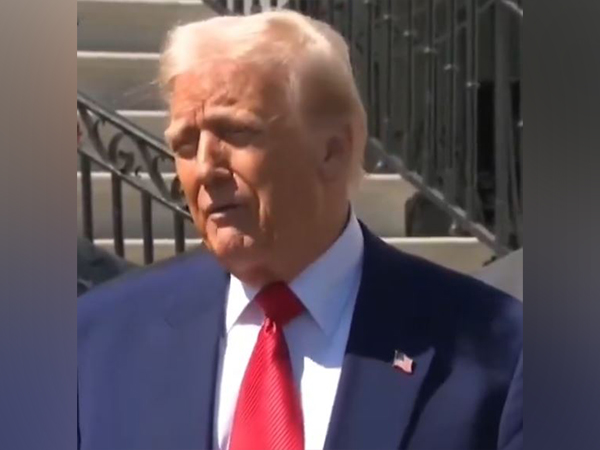Reliance Foundation, ORF, and UN India host high-profile events in New York during UNGA week
Sep 22, 2023

New York [US], September 22 : Against the backdrop of the 78th session of the United Nations General Assembly (UNGA) week, Reliance Foundation, Observer Research Foundation (ORF), and United Nations India are jointly organizing two dialogues centred around the theme, "India's journey towards the Sustainable Development Goals."
According to a media release by Reliance Foundation, the first dialogue, titled "Delivering Development: Journeys, Directions, and Lighthouses," being held on September 22, will spotlight India's ambitious agenda, addressing priorities and challenges that encompass improved health and education outcomes, food and energy security, economic empowerment and growth, and climate resilience.
The discussion will also explore India's approach in its development journey toward achieving the UN Sustainable Development Goals (SDGs).
The second dialogue, scheduled for September 23, titled "South Rising: Partnerships, Institutions, and Ideas," will delve into the role of India and the Global South in advancing the UN's Sustainable Development Goals agenda.
It will not only emphasize the significant role these regions play in global development but will also engage in discussions about the post-2030 agenda and lessons learned to move forward.
A special publication titled 'Ideas, Innovation, Implementation' will be unveiled at the event. This publication delves into the work of development organizations in India related to each of the 17 SDGs.
Ruchira Kamboj, Permanent Representative of India to the United Nations, emphasized the importance of sharing stories of success from India's development journey, which could serve as models for other countries, particularly those in the Global South.
Ruchira said, “As the world takes stock of how far we have reached towards achieving the SDGs, it is important to highlight stories of success that could be adapted in other contexts, especially by countries of the Global South. India’s development journey and innovative bottom-up multi-stakeholder approaches to achieving the UN’s Sustainable Development Goals offer exemplary models for other countries of the Global South.”
Jagannatha Kumar, CEO of Reliance Foundation, highlighted the need to look beyond 2030, aiming to identify innovative ways to address challenges.
He emphasized the importance of taking stock of past performance and envisioning a "brave new world" beyond 2030.
Kumar said, “We need to think now, beyond 2030. Even as we take stock of our performance on the SDGs, the dialogues that we are jointly hosting during the UNGA week aim to open conversations to find innovative new ways to answer this question. It is time not just to take stock of how far we have reached, but also think beyond 2030, defining what our brave new world will look like”.
“Presenting our ideas and experiences on a global platform during a significant time such as the UNGA is indeed an introspective time for organisations in the development sector. From the collective experiences of India, we have also seen resilience, a wealth of experiences and multiple insights on the path to development. As we explore these conversations, we look beyond towards actions – collective, concrete and concerted”, Kumar added.
Dr Samir Saran, President of the Observer Research Foundation, spoke about India's role as a voice of the Global South, reflecting social, economic, and environmental concerns tied to the SDGs.
He mentioned that India's practices could serve as guiding examples for the rest of the world.
Saran said, “India has emerged decisively as the voice of the Global South, and its G20 presidency has foregrounded the priorities of the developing world. Our development agenda has long reflected the social, economic and environmental concerns that define the SDGs today”.
“We are convinced that some of the approaches and practices we have evolved could act as lighthouses for other parts of the world, hasten our collective progress towards the 2030 Agenda, and serve as a legacy for the post-SDG era. In this context, the publication, Ideas, Innovation, Implementation, aims not simply to present a set of exemplary interventions, but also to spark dialogue about how we might innovate to build more equal societies, and a safe and prosperous planet,” said Saran.
Shombi Sharp, UN Resident Coordinator in India, noted that India offers optimism despite falling behind on SDG targets. He highlighted India's achievements in areas like poverty reduction, digitalization, women-led development, and renewable energy.
He urged maintaining the momentum to achieve the SDGs by 2030 and beyond.
Sharp stated, “While the SDGs remain our shared blueprint for a more prosperous and peaceful world by 2030, the world has fallen far behind at the halfway point. Yet India represents an increasing source of optimism that we can get back on track. From delivering domestic development results at a scale able to move the SDG needle, across poverty reduction, inclusive digitalization, women-led development and the energy transition, to bringing positive momentum to multilateralism and South-South cooperation, India is blazing new paths”.
“A week ago, all eyes were on the G20 as world leaders gathered to deliver an important consensus New Delhi Declaration with the SDGs at its core. We need to carry this same momentum forward to 2030 and beyond”, said Sharp.
Both dialogues are set to feature high-level speakers and experts, reinforcing the commitment of various development organizations to facilitate ongoing dialogue, innovative partnerships, and new ideas to accelerate global progress toward the SDGs.
Reliance Foundation, led by Nita M Ambani, is dedicated to addressing India's development challenges through sustainable solutions, touching the lives of over 70 million people across India in diverse areas such as rural transformation, education, health, sports, disaster management, women empowerment, urban renewal, arts, culture, and heritage.
Observer Research Foundation (ORF) is a leading multidisciplinary think tank that provides non-partisan, well-researched analyses to governments, business communities, academia, and civil society globally.
The United Nations system in India comprises 26 organizations that support India's aspirations to end poverty and inequality, promote sustainable development, and address rapid change and development priorities.




















